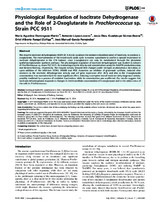Mostrar el registro sencillo del ítem
Physiological Regulation of Isocitrate Dehydrogenase and the Role of 2-Oxoglutarate in Prochlorococcus sp. Strain PCC 9511
| dc.contributor.author | Domínguez-Martín, María A. | |
| dc.contributor.author | López-Lozano, Antonio | |
| dc.contributor.author | Díez Dapena, Jesús | |
| dc.contributor.author | Gómez-Baena, Guadalupe | |
| dc.contributor.author | Rangel Zúñiga, Oriol Alberto | |
| dc.contributor.author | García-Fernández, José Manuel | |
| dc.date.accessioned | 2017-12-18T13:07:16Z | |
| dc.date.available | 2017-12-18T13:07:16Z | |
| dc.date.issued | 2014 | |
| dc.identifier.uri | http://hdl.handle.net/10396/15745 | |
| dc.description.abstract | The enzyme isocitrate dehydrogenase (ICDH; EC 1.1.1.42) catalyzes the oxidative decarboxylation of isocitrate, to produce 2- oxoglutarate. The incompleteness of the tricarboxylic acids cycle in marine cyanobacteria confers a special importance to isocitrate dehydrogenase in the C/N balance, since 2-oxoglutarate can only be metabolized through the glutamine synthetase/glutamate synthase pathway. The physiological regulation of isocitrate dehydrogenase was studied in cultures of Prochlorococcus sp. strain PCC 9511, by measuring enzyme activity and concentration using the NADPH production assay and Western blotting, respectively. The enzyme activity showed little changes under nitrogen or phosphorus starvation, or upon addition of the inhibitors DCMU, DBMIB and MSX. Azaserine, an inhibitor of glutamate synthase, induced clear increases in the isocitrate dehydrogenase activity and icd gene expression after 24 h, and also in the 2-oxoglutarate concentration. Iron starvation had the most significant effect, inducing a complete loss of isocitrate dehydrogenase activity, possibly mediated by a process of oxidative inactivation, while its concentration was unaffected. Our results suggest that isocitrate dehydrogenase responds to changes in the intracellular concentration of 2-oxoglutarate and to the redox status of the cells in Prochlorococcus. | es_ES |
| dc.format.mimetype | application/pdf | es_ES |
| dc.language.iso | eng | es_ES |
| dc.publisher | Public Library of Science | es_ES |
| dc.rights | https://creativecommons.org/licenses/by/4.0/ | es_ES |
| dc.source | PLoS ONE 9(7): e103380 (2014) | es_ES |
| dc.subject | Cyanobacteria | es_ES |
| dc.subject | Synechocystis | es_ES |
| dc.subject | Enzyme regulation | es_ES |
| dc.subject | Enzymes | es_ES |
| dc.subject | Vitamin C | es_ES |
| dc.subject | Enzyme metabolism | es_ES |
| dc.subject | Dehydrogenases | es_ES |
| dc.subject | Metabolic pathways | es_ES |
| dc.title | Physiological Regulation of Isocitrate Dehydrogenase and the Role of 2-Oxoglutarate in Prochlorococcus sp. Strain PCC 9511 | es_ES |
| dc.type | info:eu-repo/semantics/article | es_ES |
| dc.relation.publisherversion | http://dx.doi.org/10.1371/journal.pone.0103380 | es_ES |
| dc.relation.projectID | Gobierno de España. BFU-2009-08008/BMC | es_ES |
| dc.relation.projectID | Junta de Andalucía. P12-BIO-2141 | es_ES |
| dc.relation.projectID | Junta de Andalucía. PAIDI-BIO-123 | es_ES |
| dc.relation.projectID | Junta de Andalucía. P07-CVI-3055 | es_ES |
| dc.rights.accessRights | info:eu-repo/semantics/openAccess | es_ES |

